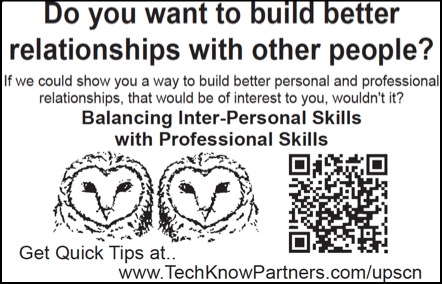Understanding Individual Competencies To Build Successful Personal and Professional Relationships
The likelihood of success in both personal and professional situations depends upon knowing your own strengths and weaknesses, knowing what is expected of you, and then being able to adapt accordingly. Understanding your individual competencies, and those of others, is a necessary step to building successful relationships.
***
Job performance is a function of aptitude, ability, and proficiency. Aptitude determines the suitability of an individual for a role; ability determines their expected quality of performance for an activity; and proficiency defines their level of competence.
Competence is characterized by both knowledge and skills. Every individual has three competency areas to varying degrees:
- Personal
- Professional/technical
- Enterpriship (entrepreneurship, leadership, management)
Personal competencies...
Personal competencies are about who we are, and have both intra-personal and inter-personal components. Intra-personal competencies are about the self. They include the basics of anticipation, aptitude, comprehension, deliberation, preferences, and stress tolerance. Inter-personal competencies include both oral and written communications, and the ability to build relationships with others.
Professional/technical competencies...
The terms "professional" and "technical" can be used broadly or narrowly.
When used broadly, the terms apply to domain knowledge in subject areas, and the accompanying technical skills. Subject areas include both arts and sciences disciplines - business is both an art and a science. Subject areas in business include: legal, finance, human resources, information technology, program management, engineering, operations, and business development. The accompanying technical skills have mental and physiological requirements, depending upon subject area.
When used narrowly, the terms apply to occupations. Professional occupations include accounting, architecture, consulting, law, marketing, medicine, and sales. Technical occupations include construction, engineering, and information technology. These terms are used by government agencies to classify jobs.
Beware of the subject matter expert - an individual who appears knowledgeable, but lacks the technical skills to achieve results. Subject matter experts may do well in interviews, but do not necessarily perform well on the job. Hence, it is important to assess the aptitude, ability, and proficiency of a candidate before hiring, or risk being fooled.
Enterpriship competencies...
Enterpriship competencies relate to the disciplines of entrepreneurship, leadership, and management. These competencies are distinct from professional competencies because they apply in both personal and professional life, and in both community-at-large and workplace settings.
Enterpriship competencies enable value to be earned and results to be achieved. They include transforming innovative ideas into value, setting direction that others will follow, and applying resources to activities to achieve results.
For example, executive directors of charities are faced with the need to find innovative ways to raise funds, to motivate others to contribute, and to manage resources on tight budgets.
For example, designers of electronic equipment have to find innovative ways to cram components into devices, be able to persuade others to use their products, and conserve resources such as batteries.
Playing to strengths and accommodating weaknesses...
When taking on any new responsibility, an individual should compare their competencies to the expected requirements of the assignment, identify the gaps, and take steps to close them accordingly. Competencies can be acquired through experience and training, if an individual is so motivated.
When building a new relationship, an individual should compare their competencies to those of the other person, identify gaps, and explore the synergistic opportunities from working together. This approach is especially beneficial in teamwork, where weaknesses in one team member can be offset by strengths in another.
Inter-personal competencies, and especially effective communications, are perhaps the most important of all. The ability to entertain, inform, convince, persuade, and negotiate with others to get things done is essential - nothing happens in business without people.
Understanding your individual competencies and those of others, so as to play your strengths and accommodate your weaknesses, is essential to success in both personal and professional relationships.



